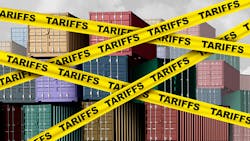Industry Trade Groups Respond to Trump Tariffs
Pointing to an “extraordinary threat” posed by undocumented immigrants and illegal drugs, President Trump signed an executive order Feb. 1 imposing tariffs on imports from Canada, Mexico and China.
However, Trump agreed on Feb. 3 to delay the tariffs on Mexico for one month after the country’s president agreed to deploy 10,000 troops at the border to curb the flow of illegal drugs into the United States.
The tariffs, 25% for Mexico and Canada and an additional 10% on Chinese goods, are expected to impact a wide range of products and materials, including chemical imports.
Industry trade groups, including the American Chemistry Council (ACC), the Society of Chemical Manufacturers and Affiliates (SOCMA), and the American Fuel and Petrochemical Manufacturers (AFPM), have issued statements highlighting the critical role that trade with Mexico and Canada plays in supporting the chemical supply chain.
The U.S. chemical industry is the second-largest export manufacturing sector, posting a trade surplus of more than $30 billion in 2023, with exports supporting nearly 200,000 jobs, ACC noted in its news release. In addition, Canada and Mexico are the U.S. chemical industry’s largest trading partners.
The trade group noted that the U.S. chemical industry continues to support the United States-Mexico-Canada Agreement (USMCA) between the three countries and urged all parties and governments involved to negotiate a solution to the issues behind the executive orders as soon as possible.
“ACC wants to work constructively with the administration to advance a trade agenda that addresses genuine challenges to our supply chain resiliency,” ACC noted. “Together, we can help stop circumvention of tariff protections and advantage U.S.-based production and exports by expanding science-based regulatory approaches that will continue to grow our competitiveness while also ensuring advantage to trading with trusted partners.”
Meanwhile, SOCMA acknowledged that the significant shift in U.S. trade policy poses serious challenges for the specialty chemical sector, disrupting well-established supply chains and increasing manufacturers' operational costs.
“For years, the USMCA has fostered a stable and predictable trade environment for the chemical industry, supporting integrated North American supply networks,” SOCMA noted. “These new tariffs threaten that stability, creating uncertainty for manufacturers that rely on the seamless movement of raw materials, intermediates, and finished products across borders. The additional costs and regulatory complications introduced by these tariffs could have far-reaching effects on production efficiency, global competitiveness, and innovation within our sector.”
Jennifer Abril, SOCMA’s president and CEO, called for a more targeted approach for addressing trade challenges that doesn’t have such a far-reaching impact on the specialty chemical supply chain.
“We urge the administration to implement trade policies that protect domestic interests while preserving access to critical raw materials and maintaining the benefits of USMCA,” she said.
Similarly, AFPM president and CEO Chet Thompson noted that U.S. refiners depend on crude oil from Canada and Mexico for affordable fuel and refined products in some regions.
“We are hopeful a resolution can be quickly reached with our North American neighbors so that crude oil, refined products and petrochemicals are removed from the tariff schedule before consumers feel the impact,” Thompson said.
About the Author
Amanda Joshi
Managing Editor
Amanda Joshi has more than 18 years of experience in business-to-business publishing for both print and digital content. Before joining Chemical Processing, she worked with Manufacturing.net and Electrical Contracting Products. She’s a versatile, award-winning editor with experience in writing and editing technical content, executing marketing strategy, developing new products, attending industry events and developing customer relationships.
Amanda graduated from Northern Illinois University in 2001 with a B.A. in English and has been an English teacher. She lives in the Chicago suburbs with her husband and daughter, and their mini Aussiedoodle, Riley. In her rare spare time, she enjoys reading, tackling DIY projects, and horseback riding.
Jonathan Katz
Executive Editor
Jonathan Katz, executive editor, brings nearly two decades of experience as a B2B journalist to Chemical Processing magazine. He has expertise on a wide range of industrial topics. Jon previously served as the managing editor for IndustryWeek magazine and, most recently, as a freelance writer specializing in content marketing for the manufacturing sector.
His knowledge areas include industrial safety, environmental compliance/sustainability, lean manufacturing/continuous improvement, Industry 4.0/automation and many other topics of interest to the Chemical Processing audience.
When he’s not working, Jon enjoys fishing, hiking and music, including a small but growing vinyl collection.
Jon resides in the Cleveland, Ohio, area.


